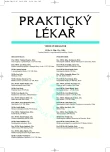-
Medical journals
- Career
Gastroesophageal reflux disease – questions and answers, myths and facts
Authors: J. Martínek 1; J. Špičák 2; O. Šlégl 1; M. Beneš 2
Authors‘ workplace: Gastroenterologické oddělení, Prim. : MUDr. Jan Martínek, Ph. D. Chirurgické oddělení, Prim. : MUDr. Tomáš Verner Klaudiánova nemocnice, Mladá Boleslav, 2Klinika hepatogastroenterologie, IKEM Praha, Přednosta: doc. MUDr. Julius Špičák, CSc. 1
Published in: Prakt. Lék. 2006; 86(10): 564-570
Category: Various Specialization
Overview
Gastroesophageal reflux disease (GERD) is a common disease. Some patients present with a mild form while others with moderate or complicated forms of the disease. At present, GPs can prescribe all of the proton pump inhibitors available on the Czech market. Thus, the majority of patients with GERD are treated and followed by their GPs while patients with complications are usually treated by gastroenterologists.
However, there are many myths concerning GERD which have an impact on the management of patients with GERD. For example many GPs, as well as gastroenterologists, do not prescribe drugs for long term treatment as they do not consider GERD to be a chronic disease; doctors often think that the nocturnal reflux is more important than the day-time (upright) reflux (the contrary is true); each hiatal hernia is often considered to require surgical treatment; omeprazole (the most frequent PPI used in the Czech Republic) is administered in the evening instead of in the morning; the role of prokinetic drugs is often overestimated; the term “reflux esophagitis” is used inappropriately, many patients are treated inadequately by out-of date drugs such as H2 receptor antagonists or metoclopramide; the indications for pH metry monitoring are not clear; there is a belief that treatment with an H2-receptor antagonist is cheaper than with proton pump inhibitors (the contrary seems to be true); etc. In this article we try to serve as “myths busters” for GPs. We hope to provoke an interesting discussion and believe it will help to improve the management of patients with GERD.Key words:
proton pump inhibitors, H2-receptor antagonists, gastroesophageal reflux disease
Labels
General practitioner for children and adolescents General practitioner for adults
Article was published inGeneral Practitioner

2006 Issue 10-
All articles in this issue
- Current state of tuberculosis epidemiology in the Czech Republic
- Human and avian influenza
- Gastroesophageal reflux disease – questions and answers, myths and facts
- Penis size and female sexual satisfaction
- Mammography for elderly women
- Our experience with pulmonary symptoms in patients with inflammatory bowel diseases.
- Small pulmonary tromboenolism
- Molecular diagnostics of prevalent hereditary gastrointestinal diseases: I. Liver diseases
- Observation of the hand as a diagnostic mirror of rheumatic and systemic diseases
- Early repolarization: how could be misinterpreted as an acute coronary ischemia
- Twenty four hour effectiveness of metoprolol tartrate in patients with newly diagnosed hypertension.
- General Practitioner
- Journal archive
- Current issue
- Online only
- About the journal
Most read in this issue- Early repolarization: how could be misinterpreted as an acute coronary ischemia
- Penis size and female sexual satisfaction
- Gastroesophageal reflux disease – questions and answers, myths and facts
- Twenty four hour effectiveness of metoprolol tartrate in patients with newly diagnosed hypertension.
Login#ADS_BOTTOM_SCRIPTS#Forgotten passwordEnter the email address that you registered with. We will send you instructions on how to set a new password.
- Career

